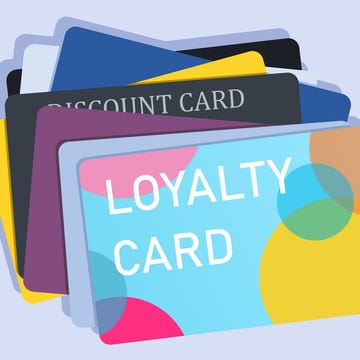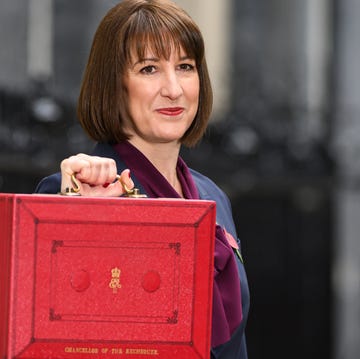If you’re looking for new ways to cut the cost of household bills, remember it’s not all about food and fuel, there are savings to be had on another essential too — your mobile. Most mobile providers increase their prices by a small amount each year to combat upgrades and costs so if you are in contract, it's likely your mobile bill will have gone up this year.
The average monthly phone bill in 2024 is around £34.51, according to Nous.co, but how much you spend will depend on the phone you have, the contract and your data usage. Data packages, inclusive texts, gigabytes, sim-only — the world of mobile phones can all feel a bit jargony and confusing. A fifth of us have never switched mobile provider and a quarter haven’t switched for more than five years, according to research for Sky Mobile.
"Changing from one handset contract to another can save you as much as £84 per year," says Simrat Sharma, mobiles expert at Uswitch.com. So what are you waiting for?
No more mid-contract price hikes!
One change that will make it easier to budget are the changes to the way mobile providers increase their prices. Ofcom is banning price rises from being linked to the inflation rate so anyone planning to switch contract from January 2025 will notified about a fixed yearly price increase when they sign up to the new deal. The change has already been implemented for new customers by some mobile networks.
It's also worth mentioning that there are some networks that don't have mid-contract price hikes, these include Voxi, Labara, Smarty, Asda Mobile and Utility Warehouse, say Uswitch.
How can I reduce my monthly phone bill?
1. Only pay for what you need
This sounds obvious and just good money-saving practice, but with phones, it feels easier said than done. How do you work out how much data you're using? Many of us don’t know and because of that tend to buy packages that over-estimate what we use, to avoid crashing over the allowance and getting a nasty shock when the bill comes in.
You use data every time you connect to your service provider’s network rather than wi-fi. Checking how much data you are using is easier than you think; for iPhone, simply go to Settings - Mobile Service and Mobile Data. Scroll down to 'Current Period and Current Period Roaming for figures showing how many gigabytes you've used, and below that, how much is used by each app. On a Samsung or Android phone, it's Network & Internet - SIMs - App Data Usage. To monitor your usage month by month, scroll down to 'reset statistics', then the figure for the current period will reset.
While you are there check through the list of apps and how much data they use, uncheck any you don’t use regularly. You may even be able to set a data alert when you get close to your cap, depending on the type of phone you have.
“For many mobile tariffs, the quantity of data available is the most significant factor in the cost of your plan, so checking you’re not paying for more data than you use can help you save. Mobile customers in the UK overestimate the amount of data they need by nearly double - the average person in the UK uses 11.7GB of data per month, however on average pays for 22.1GB of data per-month. Keep your usage in mind when choosing a tariff!" says Simrat Sharma, mobiles expert at Uswitch.com.
2. Find the best new phone + contract deal
If you're looking for a shiny, state of the art new phone — iPhone 16 or Google Pixel 9 anyone? — having a contract that provides you with the network service and a handset will help you spread the expense. The average monthly handset-and-sim-combined contract is £43, according to Uswitch's consumer insight data for 2024. But it's always worth checking whether it's cheaper to buy a package or separately.
Make sure you spend some time shopping around on Ofcom-approved comparison sites, such as MoneySuperMarket and broadbandchoices.
3. Would a sim-only deal be best?
If you’re not bothered about buying a new phone or simply don’t want a handset inclusive contract, then a sim-only deal could well be your cheapest option. "If you already own your handset, either through buying it outright or through paying it off over the life of a contract, switching to a SIM-only deal can save you as much as £352 per-year, or £29 per-month," says Simrat.
The average monthly sim-only deal costs around £12. With sim-only, you pay for minutes, text and mobile data. They are also more flexible than other contract types – from one month to 24 months, and you can use your sim in any handset, as long as it’s unlocked.
"Sim-only contracts are a good idea if you're happy with the phone you have - for example you've just come out of a two-year contract and you don't want a new handset, but you want to reduce your monthly spend," says Carrie-Ann Skinner, a tech expert who runs the Instagram channel Tech-ing It Easy . "For example - if you bought an iPhone 14 from EE today, with unlimited data, calls and texts each month on a 24-month contract - the 'plan' aspect of this deal - ie not the money you're paying towards the handset - costs £31 per month. But the same plan is available from EE on sim-only for £23 per month, so a considerable saving."
"The cheapest prices are for those that tie-in two year sim-only deals, although 12 month and 30-day contracts are available. If you do decide you want a new phone part way through the sim-only contract, the four major networks will let you upgrade to a plan with a handset after between three and six months so all won't be lost," says Carrie-Ann.
4. Save money with a refurbished phone
These are a great choice if you are on a budget as they are cheaper than buying brand new phones — and more sustainable. Buy from a reputable seller, such as the major networks, Carphone Warehouse, Envirofone, Handtec, Giffgaff or The Big Phone Store. Avoid buying from a seller on an online auction site. Giffgaff also recommends the best value plan by analysing your ongoing data usage ensuring you only pay for the data you use, whether that’s by upgrading or downgrading your plan.
"Reputable sellers test the devices to ensure they work properly - you don't get that with someone selling their old phone on eBay. You also get proof of purchase from reputable sellers which usually mean they can be insured, unlike handsets bought from online auction sites," says Carrie-Ann Skinner.
5. Switch to a cheaper deal with another mobile provider
Most of us use one of the big four – Vodafone, EE, O2 and Three. But there are around 80 providers in the market. It’s well worth checking out these smaller players for cheaper deals, especially if you are a low data user. Last May, Ofcom ranked the best and worst providers for customer services with Tesco and Giffgaff scoring highly.
If you’re not sure whether you’re able to switch to a better deal without being charged, you can text INFO to 85075 to see how much your provider would charge for leaving your contract early. Once you know whether there are additional charges to leave your contract, you can shop around.
Check the signal strength of the new provider using Ofcom mobile availability checker to assess coverage in your postcode.
A month before you contract end, start negotiating for a cheaper deal with your provider. Come armed with cheaper deals from rivals and evidence of any poor coverage or customer experiences you’ve had. In a recent haggling poll of MSE customers, 63% were successful in getting price reductions on their mobile deals.
More ways to save on your mobile bill
* Comparing made easy. MoneySavingExpert has a cheapmobilefinder tool that compares deals at more than 50 retailers and resellers.
*Do you need insurance? “Ask yourself: Am I prone to losing or breaking things? Do I tend to carry my phone in a coat pocket rather than a zipped bag (no judgement if you do!)? If you suspect you might be a 'higher risk' phone user, you probably have more need for phone insurance than others,” says Carrie-Ann.
There are different ways to get your mobile insured: as an add on to your mobile contract, standalone from a different provider, or simply as part of your household insurance cover (but check the likely excess it could be £50-£125), or cover provided by your packaged bank account.
Don't assume you are covered under your home insurance, always check. Analysing 305 contents insurance policies, Go.Compare found that fewer than 1 in 5 policies (56) included mobile phone cover away from home as standard.
*Hybrid worker? If you often find yourself working away from home, somewhere the wi-fi is patchy and you tend to tether your laptop to your phone to use the internet, you’ll be using more data. If you need to do this often, get a plan with unlimited data.
*Wi-fi hop. One way to reduce usage is to switch off mobile data so you can only go online when you have access to wi-fi. Or ask your provider about setting a data spending cap that prevents your data usage spiralling up without you realising.
*If you are going on holiday, check whether your provider charges for roaming abroad. Since Brexit, EE, Three and Vodafone all charges for using data in Europe, O2 doesn't. If you’re a frequent traveller or staying abroad for several weeks, consider a no-contract or one-month rolling sim.
*Reduce data usage by reading web pages offline whenever possible. Use the Pocket app to download those pages while you're on wi-fi and read them later offline.














